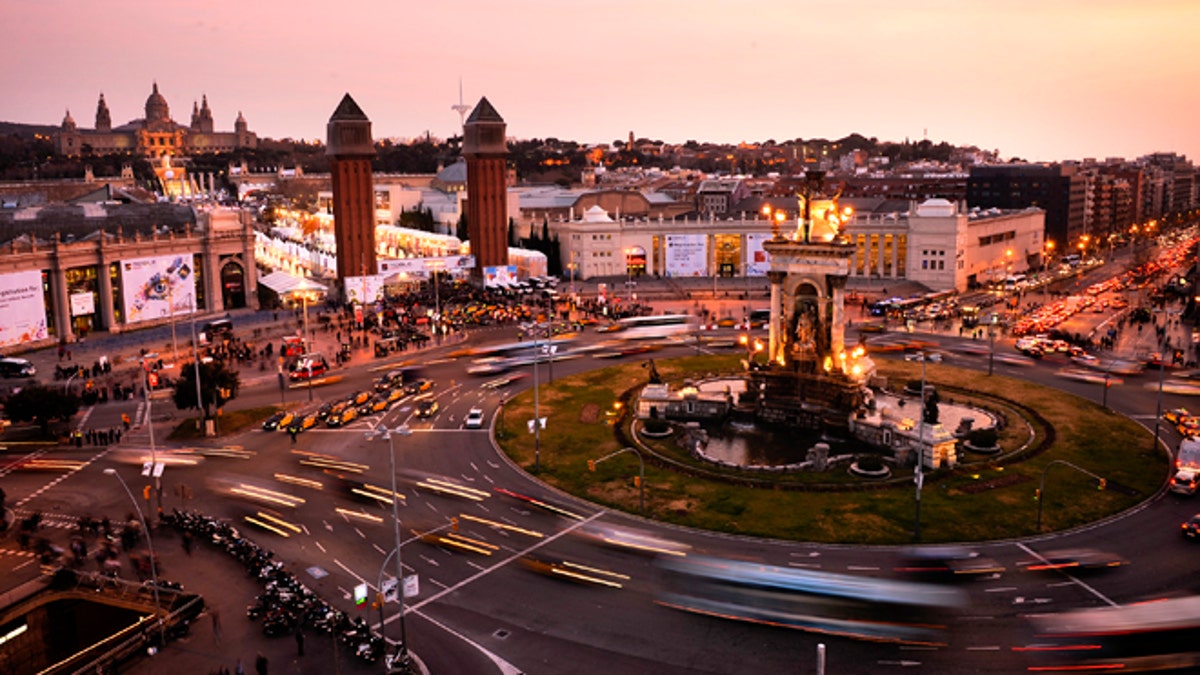
BARCELONA, SPAIN - FEBRUARY 27: A general view of the Mobile World Congress on February 27, 2012 in Barcelona, Spain. The annual Mobile World Congress hosts some of the world's largest communication companies, with many unveiling their latest phones and gadgets, and this year runs from February 27 - March 1. (Photo by David Ramos/Getty Images) (2012 Getty Images)
Barcelona is one smart city.
Not just in the sense of having a handsome downtown full of stately buildings, but also in the high-tech sense.
For one thing, there are sensors everywhere: monitoring traffic patterns, parking spaces, street lights, air pollution, meteorological conditions, the humidity of green spaces in parks—why even the trash bins have sensors monitoring how full they are.
For another, the municipal government is willing to share a lot of that information with its citizens and with entrepreneurs.
Already entrepreneur Jaume Mayor and his team created WeSmartPark, an app that allows drivers to find and reserve parking spots. Nearly 100,000 people have signed up for the service.
Mayor Agell estimated to the New York Times that drivers in Barcelona spent up to 20 percent of their commuting time looking for parking spots. “Because people are driving less to find parking spaces,” he said, “Barcelona as a city is getting a direct benefit.”
- No Pain, No Gain: Northwestern Students Develop Phone Charger Powered By Exercise
- Ignoring Latino Community May Have Cost Kathleen Sebelius Her Job
- Spain Suspends Exports Of Riot Controls To Venezuela; Says It Doesn’t Want To ‘Add Fuel To The Fire’
- Fight Between Apple And Samsung Set To Go Another Round In Court
- Spike In Stolen Artifacts In Latin America Spurs Concerns Over Rising Black Market Trade
A lot of the sensors are pilot programs the city hopes to have fully operational in the coming decade.
The trash cans, for example, will alert sanitation workers monitoring on a tablet that they need to be emptied. Routes for garbage trucks can then be rationalized and made more energy-efficient.
Street lights in large parts of the city are now shut down automatically if they don’t detect any activity nearby. Many of them also have been switched to LED bulbs.
The irrigation systems in Pobleneau Central Park monitor the moisture in the soil and turning on pop-up sprinklers. Parks department employees can also access meteorological data and rain gauges and adjust the quantity of water used.
Antoni Vives, the Deputy Mayor for Urban Habitat, told a writer for the city’s website, “You won’t find this project in any other city in the world, and we want it to become an operational standard.”
Other parks are being added to the system this month, and by the end of the year 27 percent of all city parks and gardens will be smart.
“We were wasting a lot of water” Julia Lopez, the coordinator of Barcelona’s smart city program told the Times. “We can now control the system directly from an iPad.”
The city expects to cut the municipal water bill by up to 25 percent in the process. Throw in savings from street lights and other improvements like bus lines that been made more efficient and eco-friendly, and Barcelona expects to achieve annual savings of almost $60 million.
Not exactly chump change in a city that has an unemployment rate higher than 20 percent.
The European Commission has been so impressed that in March, it named the city the “iCapital of Europe.” The competition was stiff, with 58 cities applying.
“Barcelona is a deserving winner,” Máire Geoghegan-Quinn, the Commissioner for Research, Innovation and Science said, “for its dedication to using new technology for the benefit of its inhabitants.”
In accepting the award, which carried a $700,000 prize, Barcelona mayor, Xavier Trias, reaffirmed the city’s commitment to information and communication technology. “It’s crucial that these new technologies are useful to our citizens,” he said.
Bas Boorsma, a Cisco Systems director who works with cities on their infrastructure told the paper that “Europe has embraced the concept more than the U.S…. It will always require partnerships between the private sector and government, and Europe does that better.”
Follow us on twitter.com/foxnewslatino
Like us at facebook.com/foxnewslatino







































